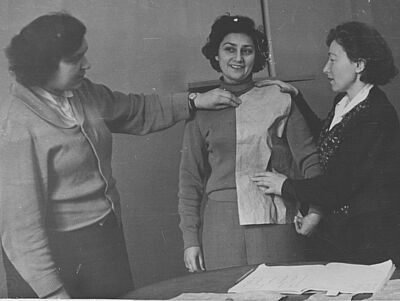ORT in Poland
View Gallery of Photos and Document Collection
ORT’s work in the newly independent Polish state started in 1921 in order to train members of the country’s impoverished Jewish community. Despite the political and economic turmoil of the 1930s Polish ORT developed very quickly. In 1939 it ran 66 institutions and trained over 4,500 students. The organisation was active in all main Polish Jewish communities and ran a whole range of courses including day schools for youths, workshops for adults, workshops for experienced artisans, preparation courses for craftsmen seeking government certification, training farms and training factories. The trades taught included metal work, machining, cabinet-making, garment skills, electrics and radio. In Lodz, boys studied auto-mechanics, cabinet making, motor winding and repair, while girls prepared for knitting and weaving in the city's textile industry. Standards of school production were of such high quality that the sale of products such as furniture, designed and manufactured in the course in cabinet-making, provided a substantial source of school income.
During the war ORT continued to work in the Warsaw ghetto, as well as in other Polish towns. In Warsaw ORT supplied craftsmen and workmen with the necessary machines, tools and raw materials to continue working. An ORT workshop for the manufacture of garments and underwear was opened in the Jewish orphanage at 92 Krochmalna Street, in March 1940. In mid-August 1940, ORT was officially authorised to open vocational courses and training workshops. Between August 1940 and November 1941 enrolment totalled more than 5,000. Work continued until the very last moment in April 1943, when the Warsaw Ghetto Uprising began and the ghetto was burnt down.
The first post-war ORT office in Poland was opened in January 1946. Overcoming various logistical problems, the organisation rebuilt an extensive network of schools and activities, which were instrumental in providing skills to more than 10,000 men, women and young people between 1945 and 1950. The main ORT vocational training centres were located in Wroclaw, Krakow, Lodz, Warsaw, Katowice, Walbrzych and Szczecin. An important part of ORT’s work was agricultural training, with two large Jewish farming centres, established in Dzierzoniow and in Szczecin. Most of the Jewish farmers later emigrated to Israel.
The post-war period of ORT’s work in Poland ended in 1950. It resumed again in 1957 with the liberalisation of the Communist regime and lasted until the Communist government’s anti-Semitic campaign of 1968.







